#Role of Women in History
Text
Why We Celebrate Women's Day: A Tribute to Resilience and Revolution
Throughout history, women have been pillars of strength, resilience, and innovation, though their achievements and struggles have often been overlooked or underrepresented. International Women's Day is not just a celebration of women, but an acknowledgment of their profound impact on society and a call to action for gender parity.
The Historical Roots
International Women's Day traces its origins back to the early 20th century. On February 28, 1909, the first National Woman's Day was observed in the United States, organized by the Socialist Party of America. This marked the beginning of a global recognition of the challenges women faced and the rights they deserved.
In 1910, Clara Zetkin, the leader of the 'Women's Office' for Germany's Social Democratic Party, proposed an idea: a celebration every year in every country on the same day as a form of international solidarity in the struggle for equal rights. The very first International Women's Day was thus celebrated on March 19, 1911.
More Than Just a Day
The celebration of Women's Day isn't about offering women a single day of acknowledgment. Instead, it's a powerful reminder that every day, women are battling stereotypes, breaking barriers, and making strides in every field imaginable. From science and technology to arts and humanities, women continue to shatter glass ceilings.
Achievements and Challenges
While Women's Day is an opportunity to celebrate the numerous achievements of women globally, it is also a day to highlight the ongoing challenges women face. Gender disparity, wage gaps, limited access to education, health issues, and violence against women are just a few of the many challenges women face daily. The day reminds us of the importance of continuous advocacy for women's rights and gender equality.
A Universal Celebration
Today, International Women's Day is celebrated in various forms across the world. It's an official holiday in several countries where women receive gifts, and celebrations are held in their honor. Meanwhile, in other nations, the focus is on protest and political action.
Moving Forward
While we have come a long way since the first Women's Day was celebrated, there's still a considerable journey ahead. The day serves as an urgent reminder of the work that remains. Gender equality benefits us all, leading to more inclusive economies, societies, and holistic growth.
In celebrating Women's Day, we don't just recognize the struggles and accomplishments of women in the past but also spotlight the pioneers, innovators, mothers, daughters, thinkers, movers, and leaders of today. By doing so, we hope to inspire and empower the next generation to push the boundaries even further.
In the end, every day should be a day where we acknowledge, uplift, and stand in solidarity with women everywhere. International Women's Day is a clarion call to action, ensuring that the flames of change continue to burn bright.
#International Women's Day#Women's History#gender equality#women's rights#women empowerment#Gender Parity#Advocacy for Women#Women's Achievements#Celebrating Women#Female Pioneers#Women's Day Origin#Women in Society#breaking stereotypes#Women's Day Celebrations#Gender Challenges#Role of Women in History#Women's Day Significance#Call to Action for Women
4 notes
·
View notes
Text
This is why we still need Women’s History Month.
By Martha Gill
What was life like for women in medieval times? “Awful” is the vague if definite answer that tends to spring to mind – but this is an assumption, and authors have been tackling it with new vigour.
The Once and Future Sex: Going Medieval on Women’s Roles in Society by Eleanor Janega, and The Wife of Bath: A Biography by Marion Turner both contend that women were not only bawdier but busier than we thought: they were brewers, blacksmiths, court poets, teachers, merchants, and master craftsmen, and they owned land too. A woman’s dowry, Janega writes, was often accompanied with firm instructions that property stay with her, regardless of what her husband wanted.
This feels like a new discovery. It isn’t, of course. Chaucer depicted many such cheerfully domineering women. The vellum letter-books of the City of London, in which the doings of the capital from 1275 to 1509 were scribbled, detail female barbers, apothecaries, armourers, shipwrights and tailors as a matter of course. While it is true that aristocratic women were considered drastically inferior to their male equivalents – traded as property and kept as ornaments – women of the lower orders lived, relatively, in a sort of rough and ready empowerment.
It was the Renaissance that vastly rolled back the rights of women. As economic power shifted, the emerging middle classes began aping their betters. They confined their women to the home, putting them at the financial mercy of men. Female religious power also dwindled. In the 13th century seeing visions and hearing voices might get a woman sainted; a hundred years later she’d more likely be burned at the stake.
“When it comes to the history of gender relations, storytellers portray women as more oppressed than they actually were”
Why does this feel like new information? Much of what we think we know about medieval times was invented by the Victorians, who had an artistic obsession with the period, and through poetry and endless retellings of the myth of King Arthur managed somehow to permanently infuse their own sexual politics into it. (Victorian women were in many respects more socially repressed than their 12th-century forebears.)
But modern storytellers are also guilty of sexist revisionism. We endlessly retread the lives of oppressed noblewomen, and ignore their secretly empowered lower-order sisters. Where poorer women are mentioned, glancingly, they are pitied as prostitutes or rape victims. Even writers who seem desperate for a “feminist take” on the period tend to ignore the angle staring them right in the face. In her 2022 cinematic romp, Catherine called Birdy, for example, Lena Dunham puts Sylvia Pankhurst-esque speeches into the mouth of her 13th-century protagonist, while portraying her impending marriage – at 14 – as normal for the period. (In fact the average 13th-century woman got married somewhere between the ages of 22 and 25.)
But we cling tight to these ideas. It is often those who push back against them who get accused of “historical revisionism”. This applies particularly to the fantasy genre, which aside from the odd preternaturally “feisty” female character, tends to portray the period as, well, a misogynistic fantasy. The Game of Thrones author George RR Martin once defended the TV series’ burlesque maltreatment of women on the grounds of realism. “I wanted my books to be strongly grounded in history and to show what medieval society was like.” Oddly enough, this didn’t apply to female body hair (or the dragons).
This is interesting. Most of our historical biases tend to run in the other direction: we assume the past was like the present. But when it comes to the history of gender relations, the opposite is true: storytellers insist on portraying women as more oppressed than they actually were.
“The history of gender relations might be more accurately painted as a tug of war between the sexes”
The casual reader of history is left with the dim impression that between the Palaeolithic era and the 19th century women suffered a sort of dark age of oppression. This is assumed to have ended some time around the invention of the lightbulb, when the idea of “gender equality” sprang into our heads and right-thinking societies set about “discovering” female competencies: women – astonishingly – could do
things men could do!
In fact the history of gender relations might be more accurately painted as a tug of war between the sexes, with women sometimes gaining and sometimes losing power – and the stronger sex opportunistically seizing control whenever it had the means.
In Minoan Crete, for example, women had similar rights and freedoms to men, taking equal part in hunting, competitions, and celebrations.
But that era ushered in one of the most patriarchal societies the planet has ever known – classical Greece, where women had no political rights and were considered “minors”.
Or take hunter-gatherer societies, the source of endless cod-evolutionary theories about female inferiority. The discovery of female skeletons with hunting paraphernalia has disproved the idea that men only hunted and women only gathered – and more recently anthropologists have challenged the idea that men had higher status too: women, studies contend, had equal sway over group decisions.
This general bias has had two unfortunate consequences. One is to impress upon us the idea that inequality is “natural”. The other is to give us a certain complacency about our own age: that feminist progress is an inevitable consequence of passing time. “She was ahead of her time,” we say, when a woman seems unusually empowered. Not necessarily.
Two years ago, remember, sprang up one of the most vicious patriarchies in history – women were removed from their schools and places of work and battoned into homes and hijabs. And last year in the US many women lost one of their fundamental rights: abortion. (Turns out it was pro-lifers, not feminists, who were ahead of their time there.)
Both these events were greeted with shock from liberal quarters: how could women’s rights be going backwards? But that only shows we should brush up on our history. Another look at medieval women is as good a place to start as any.
Martha Gill is a political journalist and former lobby correspondent
#Women’s History#books for women#The Once and Future Sex: Going Medieval on Women’s Roles in Society#Eleanor Janega#The Wife of Bath: A Biography#Marion Turner
708 notes
·
View notes
Text
Tonight's Apogee Solstice is the anniversary of Laerryn Coramar-Seelie using her Astral Leywright to banish Rau'shan and Ka'Mort, two primordials sealed beneath Toramunda, from Exandria and scatter them throughout the planes. This prevented them from joining the Betrayer Gods in the war that would become known as The Calamity, overturning a prophecy that foresaw the defeat of the Prime Deities and eternal torment for all peoples of Exandria.
In tragically related news, it is also the anniversary of the annihilation of Domunas.
1K notes
·
View notes
Text
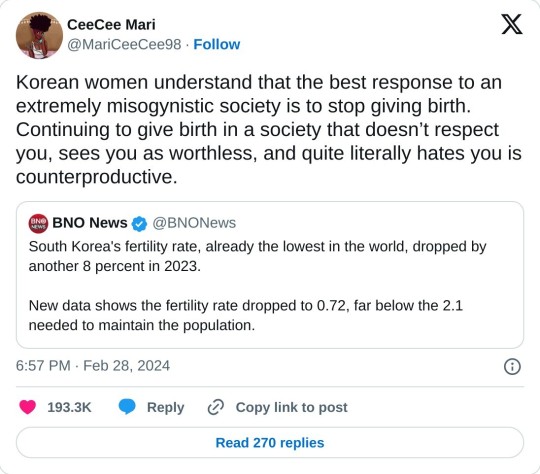
BNO News on Twitter: "South Korea's fertility rate, already the lowest in the world, dropped by another 8 percent in 2023.
New data shows the fertility rate dropped to 0.72, far below the 2.1 needed to maintain the population."
I made a post a while ago about the 4B movement in South Korea and how and why it pertains to the liberation and freedoms of Korean women. The tiktok video I shared a while ago gives background and context to Korean Feminism and current struggles that Korean women still face in their country. If you have the time to look at this as well, I highly recommend watching this video:
I am always in solidarity with Korean women, and I truly hope for real, systemic changes soon. Korean women deserve to always feel safe and protected -to always have the same access to opportunities and more.
#feminist#social justice#current events#current news#feminism#korean feminism#gender equality#gender equity#fuck gender roles#misogynistic#misogyny#south korea#fuck the patriarchy#4b movement#global news#global politics#world news#womens rights#korean history
84 notes
·
View notes
Text
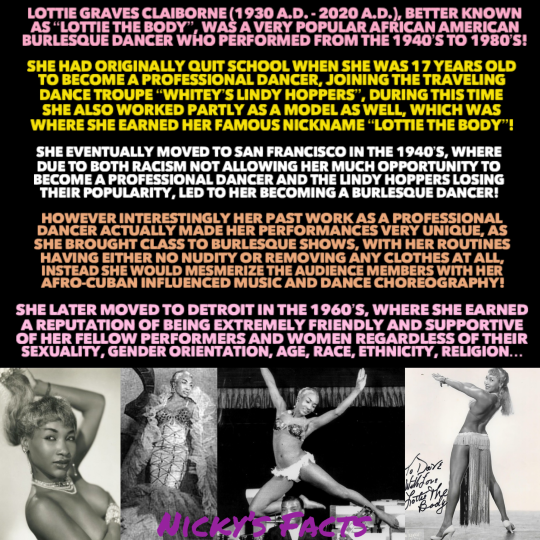
Lottie the Body brought class and acceptance to burlesque shows!
💃🏾
#history#lottie the body#burlesque#dancer#lottie graves claiborne#american history#detroit#black queen#burlesque performer#historical figures#black coquette#black history#black history month#role model#african american women#united states#girl power#black beauty#african american history#sisterhood#women supporting women#black tumblr#womens history#black girl magic#black excellence#soft black girl#women empowerment#nickys facts
76 notes
·
View notes
Text
For Women's History Month, and just ahead of International Women's Day coming up in a couple of days, Mattel have expanded their Barbie Role Models line to include eight new women.

Mattel's statement on the matter is:
Barbie is committed to shining a light on empowering role models in an effort to inspire more girls. As a part of The Barbie Dream Gap Project, we’re introducing girls to remarkable women’s stories to show them you can be anything.
As per usual these are one of a kind dolls to represent different celebrities or women who have achieved significant things in their fields. If you can't tell from the Barbie likenesses, these dolls are Helen Mirren, Maira Gomez, Viola Davis, Lila Avilés, Shania Twain, Enissa Amani, Nicole Fujita and Kylie Minogue.

Though obviously some of these women are more household names than others, and hence the news is headlined with Helen Mirren and Viola Davis, none of these women are slouches. Maira Gomez, for example, is an Amazonian influencer, and Enissa Amani is an Iranian-German comedian and activist.

I do not want to take anything away from any of the women who were chosen as Barbie Role Models, but I do wish Mattel had chosen a bit more variety in women they chose for this, as they all work essentially in the entertainment industry. However, of course, 2024's Career of the Year was Women in Film, so I hazard a guess this was a deliberate choice.
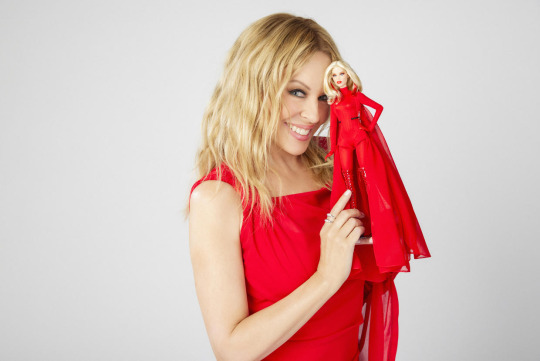
#barbie#women's history month#international women's day#women's day celebration#mattel#barbie role models#kylie minogue#padam padam#viola davis#helen mirren#shania twain#maira gomez#enissa amani#nicole fujita#lila aviles
39 notes
·
View notes
Text
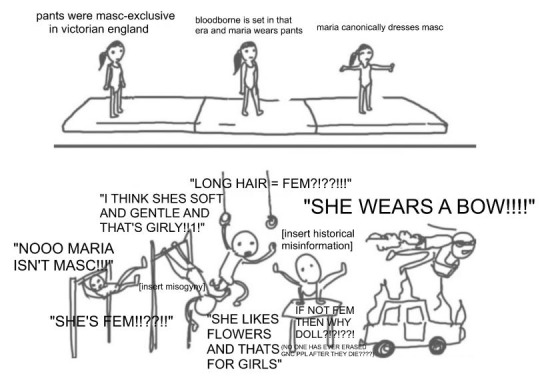
#bloodborne#not exaggerating when i say that even wearing PANTS was seen as an exclusively masc thing btw#there are Multiple cases of women literally PASSING AS DUDES by wearing pants. IN THE ARMY NO LESS!!!!!!!!!!!!!!!!!!#this one lady who wore pants to farm was seen so outlandish it warranted public backlash#women were arrested for wearing pants and button-down shirts as recently as THE SIXTIES!!!!!!!!!!!!!!!!!!!!!!!!!!!!!!#i could go more into maria's outfit as a whole but the pants ALONE make her canonically masc By Definition in the historical context :)#if ur abt to be fucking stupid on this post im Just going to block u btw#having said that if anyone DOES have normal responses or questions i really love history and i have a lot of resources#comment/reblog/inbox/dm are all fair game <333#in case anyone was curious what my inbox looked like after making that post#most of these are direct quotes :) its just silly to me#like holy [citation needed]#if u want to know more!!!!#i love her so much and im really tired of (overwhelmingly cis) people literally being so insecure in their own gender#that they just start reinventing gender roles in my inbox!!!!!#and everywhere else they can get their hands on#i think some of yall need to realize that uhhhhhhh#butch lesbians seeing maria as a butch lesbian is not fucking '''''''tokenism'''''''''''' or whatever#that is Literally Not What That Word Means#but it may be worth examining why you are so upset by it?#or barring that........have some genuine curiosity about the history of gender.......because its really cool to research imo
245 notes
·
View notes
Text
Actually, I really wish Tumblr as a whole was less comfortable using feminizing language for gay men, especially gay East Asian men.
#unforth rambles#brought to you by the person i saw call chu wanning 'mo ran's mother' and the person who defended them#putting aside the question of accuracy re his role in mo ran's life#the words parent and father both exist yall#like idk but also wtf#see also girlboss and such being applied to gay men#idk i feel like im in the vast minority on this one#but my whole life ive seen gay men feminized in real life against their will#no matter how masc they were or wanted to be everything became fem#maybe im just to old to be with the times on why this is cute and funny abd okay#but given tumblr demographics and all#like shit like this is imo why so many women and afab nb people in fandom get accused of fetishizing#we older queers remember when doing this was considered disgusting homophobia actually#and imo it goes double or triple when they gay men in question are east asian#i really wish we could just fuckin stop#to be clear im not saying it IS fetishizing im saying i wish there was more awareness of the history of forced feminizing language#being used towars gay men in general and toward east asian men regardless of sexuality#for a lot of people i gotta think the knee jerk reaction to this kinda language being used is these context isnt teehee how cute#its ew who would say that#anyway i blocked op on the mo ran stuff but it still left a bad taste in my mouth
26 notes
·
View notes
Text
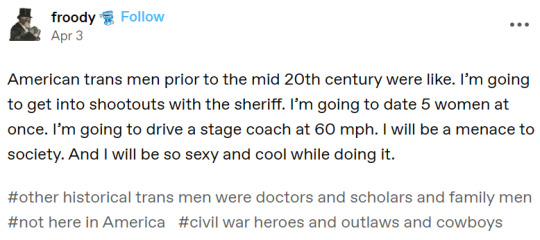
bro you know whats fucked up... their epic gnc lesbian swag is literally being erased rn. and its just another man doing all of the cool shit again. like thats fucked up. theyre literally erasing women.
#like... do you know how badly i would have wanted to hear about a WOMAN who did those things as a kid#how badly i would have wanted to hear that women were never ok with their assigned roles#and broke out of them and did what they wanted all throughout history#and that women werent inherently meek and mild and feminine. and that they could have lives on their own terms#and i would have known that if women in the past did it then i could do it too#like fuck this shit. everytime a woman does cool shit it is always erased#terf safe#terfs do interact#gender critical#radblr#terfblr#i know this doesnt really qualify as part of a 'male depravity archive' but i wanted to put this SOMEWHERE.#i feel like im not putting this into words very well but i feel very strongly about this#bc my whole life ive always wanted to hear about women with that kind of swag and that kind of life#and its so fucking unfair#non-MDA posts
33 notes
·
View notes
Text
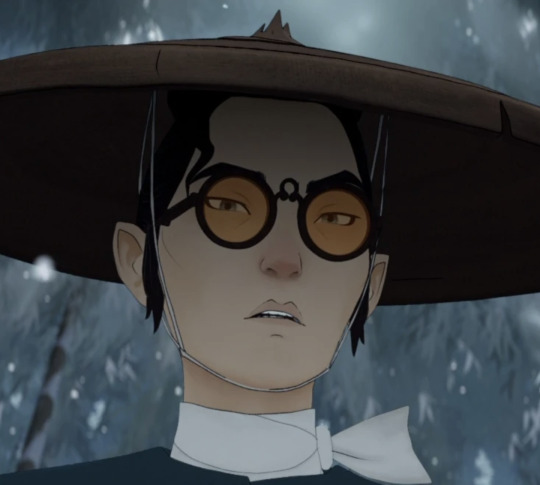
I watched all eight episodes of season 1 of Blue Eye Samurai over the weekend. I then went browsing because I wanted to read some online reviews of the show to see what people were thinking of it and also because I wanted to interact with gifs and art, as the series is visually stunning.
Yet, in my search for opinions on the show, I came across several points I'd like to address in my own words:
Mizu’s history and identity are revealed piece-by-piece and the “peaches” scene with Mizu and Ringo at the lake is intended to be a major character reveal. I think it’s weird that some viewers got angry over other viewers intentionally not gendering Mizu until that reveal, rather than immediately jumping to gender the character as the other characters in the show do. The creators intentionally left Mizu’s gender and sexuality ambiguous (and quite literally wrote in lines to lead audiences to question both) to challenge the viewer’s gut assumption that this lone wolf samurai is a man. That intentional ambiguity will lead to wide and ambiguous interpretations of where Mizu fits in, if Mizu fits in at all. But don't just take my word for this:
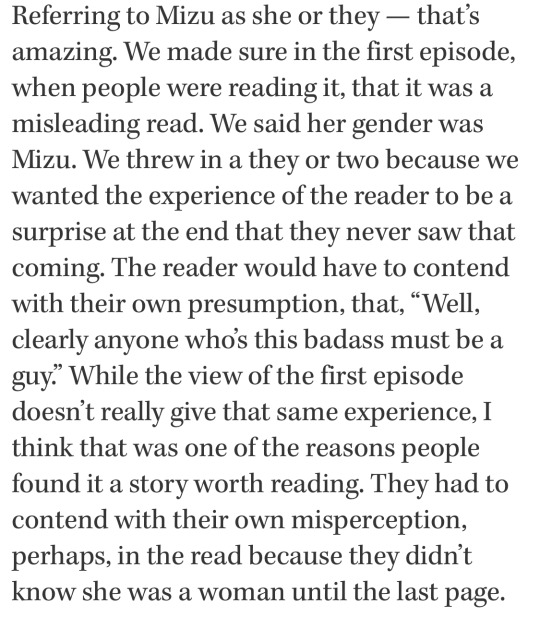
Re: above. I also think it’s weird that some viewers got upset over other viewers continuing to acknowledge that Mizu has a very complicated relationship with her gender, even after that reveal. Canonically, she has a very complicated relationship with her identity. The character is intended to represent liminality in identity, where she’s often between identities in a world of forced binaries that aren’t (widely) socially recognized as binaries. But, again, don’t just take my word for this:
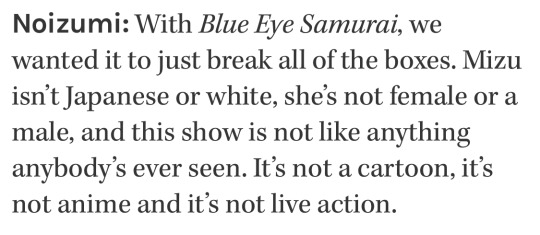
Mizu is both white and Japanese, but she is also not white and not Japanese simultaneously (too white to be Japanese and too Japanese to be white). She’s a woman and a man. She’s a man who’s a woman. She’s also a woman who’s not a woman (yet also not quite a man). But she’s also a woman; the creators said so. Mizu was raised as a boy and grew into a man, yet she was born a girl, and boyhood was imposed upon her. She’s a woman when she’s a man, a man when she’s a man, and a woman when she’s a woman.
Additionally, Mizu straddles the line between human and demon. She’s a human in the sense she’s mortal but a demon in the sense she’s not. She's human yet otherworldly. She's fallible yet greatness. She's both the ronin and the bride, the samurai and the onryō. In short, it’s complicated, and that’s the point. Ignoring that ignores a large part of her internal character struggle and development.
Mizu is intended to represent an “other,” someone who stands outside her society in every way and goes to lengths to hide this “otherness” to get by. Gender is a mask; a tool. She either hides behind a wide-brimmed hat, glasses, and laconic anger, or she hides behind makeup, her dress, and a frown. She fits in nowhere, no matter the identity she assumes. Mizu lives in a very different time period within a very different sociocultural & political system where the concept of gender and the language surrounding it is unlike what we are familiar with in our every-day lives. But, again, don’t just take my word for this:
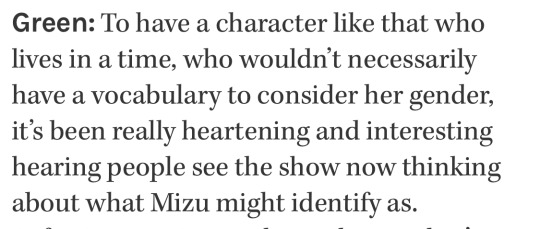
It’s also weird that some viewers have gotten upset over the fact women and queer people (and especially queer women) see themselves in Mizu. Given her complicated relationship with identity under the patriarchy and colonial violence, I think Mizu is a great character for cis-het women and queer folks alike to relate to. Her character is also great for how she breaks the mold on the role of a biracial character in narratives about identity (she’s not some great bridge who will unite everyone). It does not hurt anyone that gender-fluid and nonbinary people see themselves in Mizu's identity and struggle with identity. It does not hurt anyone that lesbians see themselves in the way Mizu expresses her gender. It does not hurt anyone that trans men see themselves in Mizu's relationship with manhood or that trans women can see themselves in Mizu when Mama forces her to be a boy. It's also really cool that cis-het women see themselves in Mizu's struggles to find herself. Those upset over these things are missing critical aspects of Mizu's character and are no different from the other characters in the story. The only time Mizu is herself is when she’s just Mizu (“…her gender was Mizu”), and many of the other characters are unwilling to accept "just Mizu." Accepting her means accepting the complicatedness of her gender.
Being a woman under the patriarchy is complicated and gives women a complicated relationship with their gender and identity. It is dangerous to be a woman. Women face violence for being women. Being someone who challenges sex-prescribed norms and roles under patriarchy also gives someone a complicated relationship with their identity. It is dangerous to usurp gender norms and roles (then combine that with being a woman...). People who challenge the strict boxes they're assigned face violence for existing, too. Being a racial or ethnic minority in a racially homogeneous political system additionally gives someone a complicated relationship with their identity. It is dangerous to be an ethnic minority when the political system is reproduced on your exclusion and otherness. They, too, face violence for the circumstances of their birth. All of these things are true. None of them take away from the other.
Mizu is young-- in her early 20s-- and she has been hurt in deeply affecting ways. She's angry because she's been hurt in so many different ways. She's been hurt by gender violence, like "mama's" misogyny and the situation of her birth (her mother's rape and her near murder as a child), not to mention the violent and dehumanizing treatment of the women around her. She's been hurt by racial violence, like the way she has been tormented and abused since childhood for the way she looks (with people twice trying to kill her for this before adulthood). She's been hurt by state-sanctioned violence as she faces off against the opium, flesh, and black market traders working with white men in contravention of the Shogun's very policies, yet with sanction from the Shogun. She's been hurt by colonial violence, like the circumstances of her birth and the flood of human trafficking and weapons and drug trafficking in her country. She's had men break her bones and knock her down before, but only Fowler sexually differentiated her based on bone density and fracture.
Mizu also straddles the line between victim and murderer.
It seems like Mizu finding her 'feminine' and coming to terms with her 'female side' may be a part of her future character development. Women who feel caged by modern patriarchal systems and alienated from their bodies due to the patriarchy will see themselves in Mizu. They understand a desire for freedom that the narrow archetypes of the patriarchy do not afford them as women, and they see their anger and their desire for freedom in Mizu. This, especially considering that Mizu's development was driven by one of the creators' own experiences with womanhood:
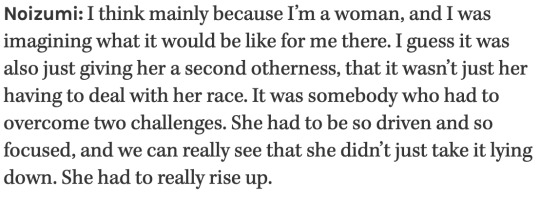
No, Mizu does not pass as a man because she "hates women" or because she hates herself as a woman or being a woman. There are actual on-screen depictions of Mizu's misogyny, like her interactions with Akemi, and dressing like a man is not an instance of this. Mizu shows no discomfort with being a woman or being seen as a woman, especially when she intends to pass herself as and present as a woman. Mizu also shows the women in the series more grace and consideration than any man in the show, in whatever capacity available to her socially and politically, without revealing herself; many of the women have remarked that she is quite unlike other men, and she's okay with that, too.
When she lives on the farm with Mama and Mikio, Mizu shows no discomfort once she acclimates to the new life. But people take this as conclusive evidence of the "only time" she was happy. She was not. This life was also a dance, a performance. The story of her being both the ronin and the onryō revealed to the audience that this lifestyle also requires her to wear a mask and dance, just as the bride does. This mask is makeup, a wedding dress, and submission, and this performance is her gender as a wife. She still understands that she cannot fully be herself and only begins to express happiness and shed her reservation when she believes she is finally safe to be herself. Only to be betrayed. Being a man is her safety, and it is familiar. Being a boy protected her from the white men as a child, and it might protect her heart now.
Mizu shows no discomfort with being known as a woman, except when it potentially threatens her goals (see Ringo and the "peaches" scene). She also shows no discomfort with being known as, seen as, or referred to as a man. As an adult, she seems okay- even familiar- with people assuming she's a man and placing her into the role of a man. Yet, being born a girl who has boyhood violently imposed upon her (she did not choose what mama did to her) is also an incredibly important part of her lived experience. Being forced into boyhood, but growing into a man anyway became part of who she is. But, being a man isn’t just a part of who she became; it’s also expedient for her goals because men and women are ontologically different in her world and the system she lives under.
She's both because she's neither, because- ontologically- she fits nowhere. When other characters point out how "unlike" a man she is, she just shrugs it off, but not in a "well, yeah, because I'm NOT a man" sort of way, but in an "I'm unlike anyone, period," sort of way. She also does not seem offended by Madam Kaji saying that Mizu’s more man than any who have walked through her door.
(Mizu doesn’t even see herself as human, let alone a woman, as so defined by her society. And knowing that creators have stated her future arc is about coming into her “feminine era” or energy, I am actually scared that this show might fall into the trope of “domesticating”/“taming” the independent woman, complete with an allegory that her anger and lack of human-ness [in Mizu’s mind] is a result of a woman having too much “masculine energy” or being masculine in contravention of womanness.)
Some also seem to forget that once Mama and Mikio are dead, no one knows who she is or where she came from. They do not have her background, and they do not know about the bounty on her (who levied the bounty and why has not yet been explained). After their deaths, she could have gone free and started anew somehow. But in that moment, she chose to go back to life as a man and chose to pursue revenge for the circumstances of her birth. Going forward, this identity is no longer imposed upon her by Mama, or a result of erroneous conclusions from local kids and Master Eiji; it was because she wanted people to see her as a man and she was familiar with navigating her world, and thus her future, as a man. And it was because she was angry, too, and only men can act on their anger.
I do think it important to note that Mizu really began to allow herself to be vulnerable and open as a woman, until she was betrayed. The question I've been rattling around is: is this because she began to feel safe for the first time in her life, or is this part of how she sees women ontologically? Because she immediately returns to being a man and emotionally hard following her betrayal. But, she does seem willing to confide in Master Eiji, seek his advice, and convey her anxieties to him.
Being a man also confines Mizu to strict social boxes, and passing herself as a man is also dangerous.
Mizu doesn't suddenly get to do everything and anything she wants because she passes as a man. She has to consider her safety and the danger of her sex being "found out." She must also consider what will draw unnecessary attention to her and distract her from her goals. Many viewers, for example, were indignant that she did not offer to chaperone the mother and daughter and, instead, left them to the cold, only to drop some money at their feet later. The indignity fails consider that while she could bribe herself inside while passing as a man, she could not bribe in two strangers. Mizu is a strange man to that woman and does not necessarily have the social position to advocate for the mother and daughter. She also must consider that causing small social stirs would distract from her goals and draw certain attention to her. Mizu is also on a dangerous and violent quest.
Edo Japan was governed by strict class, age, and gender rules. Those rules applied to men as well as women. Mizu is still expected to act within these strict rules when she's a man. Being a man might allow her to pursue revenge, but she's still expected to put herself forward as a man, and that means following all the specific rules that apply to her class as a samurai, an artisan (or artist), and a man. That wide-brimmed hat, those orange-tinted glasses, and her laconic tendencies are also part of a performance. Being a boy is the first mask she wore and dance she performed, and she was originally (and tragically) forced into it.
Challenging the normative identities of her society does not guarantee her safety. She has limitations because of her "otherness," and the transgression of sex-prescribed roles has often landed people in hot water as opposed to saving them from boiling. Mizu is passing herself off as a man every day of her life at great risk to her. If her sex is "found out" on a larger scale, society won’t resort to or just start treating her as a woman. There are far worse fates than being perceived as a woman, and hers would not simply be a tsk-tsk, slap on the wrist; now you have to wear makeup. Let's not treat being a woman-- even with all the pressures, standards, fears, and risks that come with existing as a woman-- as the worst consequence for being ‘found out’ for transgressing normative identity.
The violence Mizu would face upon being "found out" won’t only be a consequence of being a "girl." Consider not just the fact she is female and “cross-dressing” (outside of theater), but also that she is a racial minority.
I also feel like many cis-het people either ignore or just cannot see the queerness in challenging gender roles (and thus also in stories that revolve around a subversion of sex-prescribed gender). They may not know how queerness-- or "otherness"-- leads to challenging strict social stratifications and binaries nor how challenging them is seen by the larger society as queer ("strange," "suspicious," "unconventional," even "dishonorable," and "fraudulent"), even when "queerness" (as in LGBTQ+) was not yet a concept as we understand it today.
Gender and sexuality- and the language we use to communicate who we are- varies greatly across time and culture. Edo Japan was governed by strict rules on what hairstyles, clothes, and weapons could be worn by which gender, age, and social group, and this was often enshrined in law. There were specific rules about who could have sex with whom and how. These values and rules were distinctly Japanese and would not incorporate Western influences until the late 1800s. Class was one of the most consequential features to define a person's fate in feudal Japan, and gender was quite stratified. This does not mean it's inappropriate for genderqueer people to see themselves in Mizu, nor does this mean that gender-variant identities didn’t exist in Edo Japan.
People in the past did not use the same language we do today to refer to themselves. Example: Alexander The Great did not call himself a "bisexual." We all understand this. However, there is a very weird trend of people using these differences in language and cultures across time to deny aspects of a historical person's life that societies today consider taboo, whether these aspects were considered taboo during that historical time period or not. Same example: people on Twitter complaining that Netflix "made" Alexander The Great "gay," and after people push back and point out that the man did, in fact, love and fuck men, hitting back with "homosexuality wasn't even a word back then" or "modern identity didn't exist back then." Sure, that word did not exist in 300s BCE Macedonia, but that doesn't mean the man didn't love men, nor does that mean that we can't recognize that he'd be considered "queer" by today's standards and language.
Genderqueer, as a word and as the concept is understood today, did not exist in feudal Japan, but the people did and feudal Japan had its own terms and concepts that referred to gender variance. But while the show takes place in Edo Japan, it is a modern adult animation series made by a French studio and two Americans (nationality). Mizu is additionally a fictional character, not a historical figure. She was not created in a vacuum. She was created in the 21st century and co-written by a man who got his start writing for Sex in the City and hails from a country that is in the midst of a giant moral panic about genderqueer/gender-variant people and gender non-conforming people.
This series was created by two Americans (nationality) for an American company. In some parts of that country, there are laws on the book strictly defining the bounds of men and women and dictating what clothes men and women could be prosecuted for wearing. Changes in language and identity over time mean that we can recognize that if Mizu lived in modern Texas, the law would consider her a drag performer, and modern political movements in the show creators' home country would include her under the queer umbrella.
So, yeah, there will also be genderqueer people who see themselves in Mizu, and there will be genderqueer fans who are firm about Mizu being queer to them and in their “headcanons.” The scene setting being Edo Japan, does not negate the modern ideas that influence the show. "Nonbinary didn't exist in Edo Japan" completely ignores that this show was created to explore the liminality of modern racial, gender, class, and normative identities. One of the creators was literally inspired by her own relationship with her biracial identity.
Ultimately, the fact Mizu, at this point in her journey, chooses to present and pass as a man and the fact her presented gender affects relationship dynamics with other characters (see: Taigen) gives this story a queer undertone. And this may have been largely unintentional: "She’s a girl, and he’s a guy, so, of course, they get together," < ignoring how said guy thinks she’s a guy and that she intentionally passes herself as a guy. Audiences ARE going to interpret this as queer because WE don’t live in Edo-era Japan. And I feel like people forget that Mizu can be a woman and the story can still have queer undertones to it at the same time.
#Blue Eye Samurai#‘If I was transported back in time… I’d try to pass myself off as a man for greater freedom.’#^^^ does not consider the intersection of historically queer existence across time with other identities (& the limitations those include)#nor does it consider the danger of such an action#I get it. some come to this conclusion simply because they know how dangerous it is to be a woman throughout history.#but rebuking the normative identities of that time period also puts you at great risk of violence#challenging norms and rules and social & political hierarchies does not make you safer#and it has always been those who exist in the margins of society who have challenged sociocultural systems#it has always been those at greatest risk and who've faced great violence already. like Mizu#Anyway... Mizu is just Mizu#she is gender queer (or gender-variant)#because her relationship with her gender is queer. because she is gender-variant#‘queer’ as a social/political class did not exist. but people WE understand as queer existed in different historical eras#and under different cultural systems#she’s a woman because queer did not exist & ‘woman’ was the sex caste she was born into#she’s also a woman because she conceptualizes herself as so#she is a woman AND she is gender-variant#she quite literally challenges normative identity and is a clear example of what sex non-conforming means#Before the actual. historic Tokugawa shogunate banned women from theater#there were women in the theater who cross-dressed for the theater and played male roles#so I’m also really tired of seeing takes along the lines of: ‘Edo Japan was backwards so cross dressers did’t exist then!’#like. please. be more transparent won’t you?
17 notes
·
View notes
Text
Queen 👑👑👑 Mrs. King. Coretta Scott King.
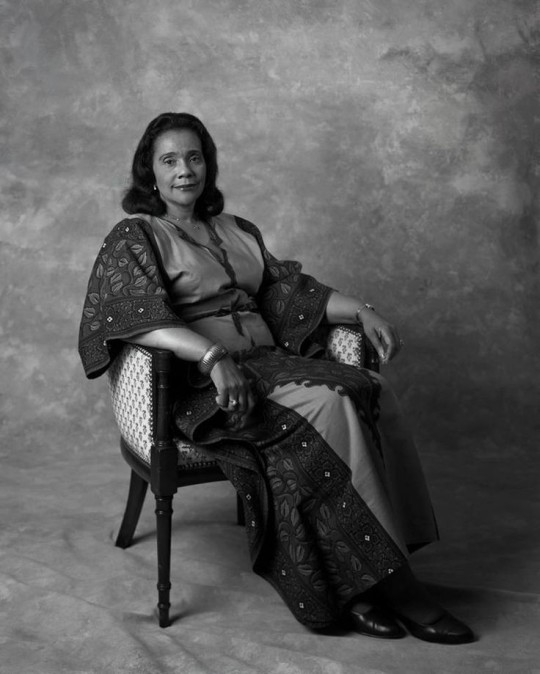
#coretta scott king#black tumblr#black literature#black excellence#black history#black community#civil rights#black history is american history#civil rights movement#black girl magic#blackexcellence365#beautiful woman#education#beautiful hair#black girls are beautiful#black women are beautiful#role models#strong black woman#boycott#equal rights#equal justice#equality
145 notes
·
View notes
Text
While the colonial [American] woman shared many of the same grounds for the cultivation of a sense of self-worth as a man, such as pride in family and the possession and exercise of productive work skills, the woman in the expanding era of Jacksonian democracy had a far less adequate basis for self-satisfaction than her brother had. From the perspective of a man, American society in 1820 was an open vista of opportunity: by dint of hard work he could hope to improve his position in society; if he did not succeed in one locality, he could move on to another, carrying his skills with him; with opportunity opening through education and the professionalization of many occupations such as medicine and law, his family could give him a head start on future success. These same changes had an opposite effect on women. With work separated from the household, with shops expanded into larger establishments, with cloth manufactured in factories, and with social status generally something to be "achieved," women were effectively cut off from participation in the significant work of their society. A woman's labor at home was less valued, and her husband was apt to invest large amounts of time and energy in economic efforts away from the house hold. As a result, the grounds for a woman's sense of self-worth narrowed during the decades when men's expanded.
As women's "real" contributions declined in worth, it seems that her qualities as a "woman" expanded, paving the way for the emergence of the cult of True Womanhood in the 1820-1860 period (Welter 1966). What mattered for a woman by the late 1820s were four qualities: piety, purity, submissiveness, and domesticity. The new prevalent values in the larger Jacksonian society—education, success at work, and political participation—were denied to women. As economic affluence increased with the growth of the new industrialism and expansion of trade, women's worth declined as producers and increased as consumers. While an unattached woman in colonial America was granted land or access to work to support herself, the Jacksonian woman was restricted. While schools were opening for young males, physicians and educators were arguing that the female brain and nervous system were insufficiently stable to sustain intellectual effort. Even an occupation as traditionally female as midwifery was being transformed into the field of obstetrics, controlled by male physicians. (The number of medical school graduates increased over fifty times from the turn of the century to the 1840s; by the 1850s physicians rather than midwives delivered most American babies [Rothstein 1972: 108-109].) While a colonial woman could take pride in her ability to manage a farm or run a business with her husband and to continue such management after his death, her Jacksonian descendant was far more restricted to domestic arts and skills (Rosenberg 1971; Lerner 1966).
But the cult of True Womanhood, focusing on submission and patience, was no preparation for women's real responsibilities within a family. Fragility and submission might suffice in courtship or in marital sex, but they did not prepare a woman for the physical and emotional stamina required by repeated pregnancies and the rearing of a large family of children. The conflict inherent in the lack of fit between the cultural ideal of True Womanhood and the social reality of homemaking and maternal roles has been thought by some historians to be at the root of the widespread rise of hysteria among women as the nineteenth century unfolded (Smith 1971; Rosenberg 1972). Rosenberg interprets this phenomenon as a withdrawal into the role of invalid, in which dependency and fragility are legitimate expectations consistent with the cultural stereotype of a wife but which protected the woman from the sexual demands of her husband and the heavy physical and emotional demands of household and child-care duties.
Thus the transformation of the egalitarian ethos from a political ideal in the revolution into the fabric of society meant an expansion of many opportunities for an increasing number of men but a shrinking sphere of participation for women in education, work, and political affairs. But as Rosenberg (1971:563) has pointed out, "Though many aspects of Jacksonianism have been subjected to historical investigation, the possibly stressful effects of such structural change upon family and sex roles have not."
-Alice S. Rossi, The Feminist Papers: From Adams to de Beauvoir
#Alice rossi#amerika#sex roles#female oppression#womens history#true womanhood#land of the free#female hysteria#american history
15 notes
·
View notes
Text
"Stratonike evidently retained the Akkadian royal title used for her even after [her husband] Antiochos’ death, since the astronomical diary entry identifies her as šarratu, in logograms GAŠAN, which means “queen.” In earlier centuries under previous regimes this title could not be used of a royal woman unless she also ruled. As suggestive as this is, there is no direct corroborating evidence for Stratonike exercising rulership, unless we credit her influence with her children as a form of political dominance. The trope of the domineering dowager queen mother should be familiar enough from interpretations of other royal families throughout history. But the diary, normally fairly precise in noting royal family connections, does not call her “mother [or widow] of the king,” meaning that at least some people remembered Stratonike as a queenly figure on her own, without reference to male relatives. This is an interesting hint at how these royal women could carry out their duties so as to be regarded as individual rulers in their own right."
-Gillian Ramsey, "Apama and Stratonike: The first Seleukid basilissai," "The Routledge Companion to Women and Monarchy in the Ancient Mediterranean World" (edited by Elizabeth D. Carney and Sabine Müller)
#historicwomendaily#stratonike#ancient history#hellenistic period#history#mine#It's so fascinating to compare the power and importance that the Babylonian astronomical diary gives her#with the way she's framed as a passive romantic figure and love interest by later classical writers#The contrast is striking#speaking of which:#I remember reading Elizabeth D. Carney's book 'Women and Monarchy in Macedonia'#where she spoke about Stratonike identifying with her birth family rather than her husbands as Basilissa#and speculates that it was because she had more influence with her brother than her husband and son#and also that there is no evidence of her playing any role in her husband or son's reigns#which is bizarre to me because it's...obviously not true. It's a conclusion drawn from silence without considering our terribly#scarce sources for the Seleukids during that time#But the evidence that we do have - especially this unusual reference in the astronomical diary - clearly indicates the OPPOSITE#Stratonike's specific identity as Basilissa certainly does not indicate her lack of influence - instead it indicates her autonomy and agenc#And while we lack hard evidence of her activities what this Babylonian reference indicates#She conducted a indivudual ruler in her own right#We lack evidence.#The lack of hard evidence of Stratonike's activities as queen & dowager certainly does not indicate that she had 'no role' during that time#instead this Babylonian reference indicates that not only was her political role considerable but that it was more akin to an individual#ruler in her own right#which is absolutely fascinating#It's just unfortunate that we lack specific evidence for her activities :(
6 notes
·
View notes
Text
"We therefore need to separate out the 'facets' of [Anne de Pisseleu's] life, the way she was perceived by different groups and individuals. According to these, she could be viewed as an ornament to the court, a grasping favorite, a desired patroness, an able businesswoman, later on as a pillar of the reformed church and cantankerous old woman. At different times and over a long life, Anne de Pisseleu played all these roles."
David Potter, "The Life and After-Life of a Royal Mistress: Anne de Pisseleu, Duchess of Étampes"
#historicwomendaily#I wanted this to be my first post on this blog for this new year because I love her! So much!#She's absolutely captivating and had such a colourful and unapologetic life#anne de pisseleu#french history#Francis I#16th century#my post#queue#I can't believe I haven't posted anything about her before - she's probably one my top 10 most interesting historical women#She's ridiculously overlooked & underrated which is bizarre considering how infamous and wildly important she was during her life#But instead her vital impact on Francis's reign and on the informal 'institution' of the French royal mistress is often completely erased#or trivialized in historical accounts - both general and academic#And when she *is* noticed she's demonized (and thus dismissed) as capricious/duplicitous/vengeful/selfish etc#as Kathleen Wellman* points out: a lot of this is due to her ties to Francis I - who's considered the most important French Renaissance Kin#So Anne's power and impact is diminished and downplayed in order to preserve and lionize his reputation#but she's simultaneously viewed as the villainous who's responsible for his mistakes. It's inherently contradictory :/#(not to say that she was pristine or faultless or anything - ofc not - but I think you get what I'm saying)#and of course she was seen as 'the epitome of the deleterious effects of giving women too much authority' during her time so that probably#plays a key role in how she's currently perceived#she's also sometimes viewed as a sort of 'prelude' to Diane de Poitiers - which is ridiculous because it's *Anne* who set the precedent#for a lot of things Diane and later royal mistresses are now renowned for. But her spearheading role and immense impact is never#highlighted or credited as much as it should be.#Oh well. At least David Potter and Tracy Adams are doing a great job with her. Props to them they're fantastic :)#(btw I genuinely think that people who are interested in Anne Boleyn should look her up I think y'all will really like her)#(Both Annes were direct contemporaries and I think they had a very similar style)#*Wellman's book had lots of errors and assumptions but eh
14 notes
·
View notes
Text
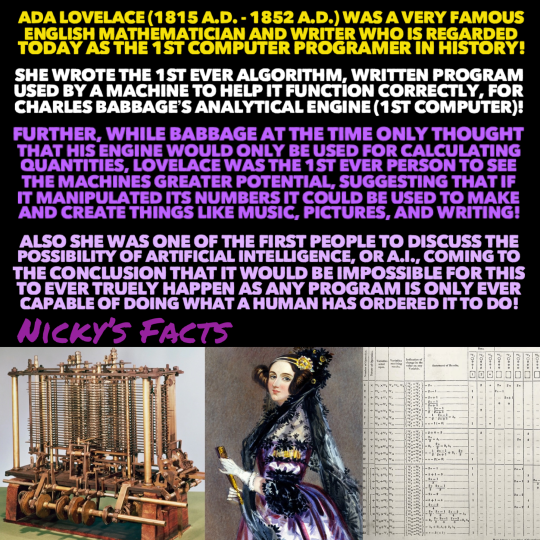

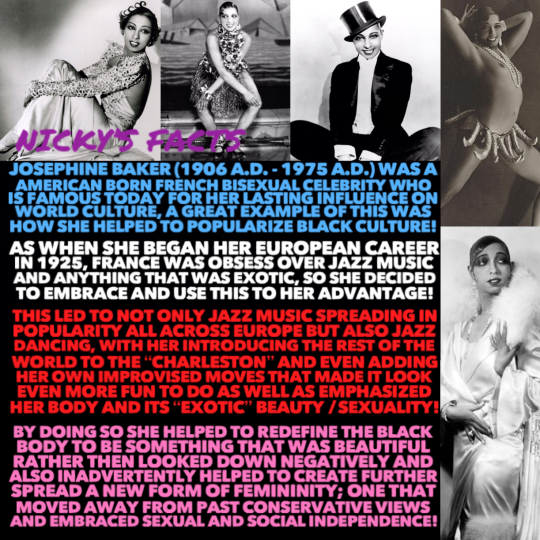

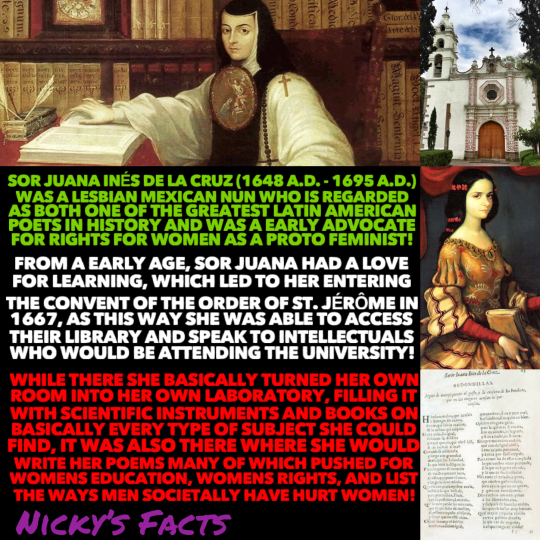
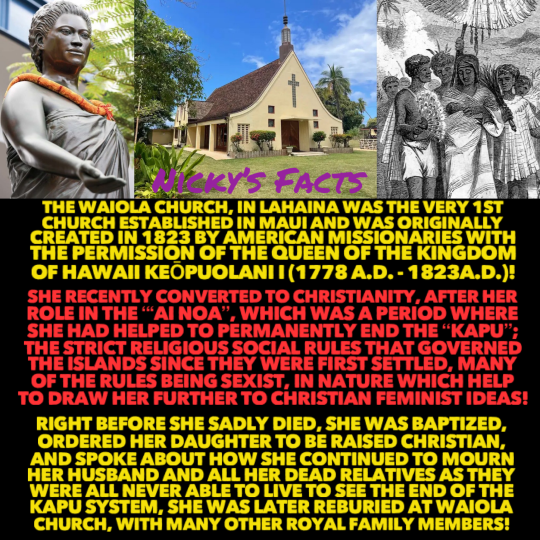
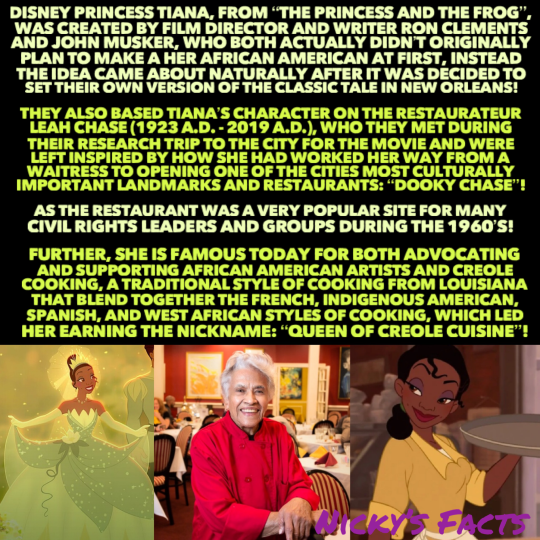
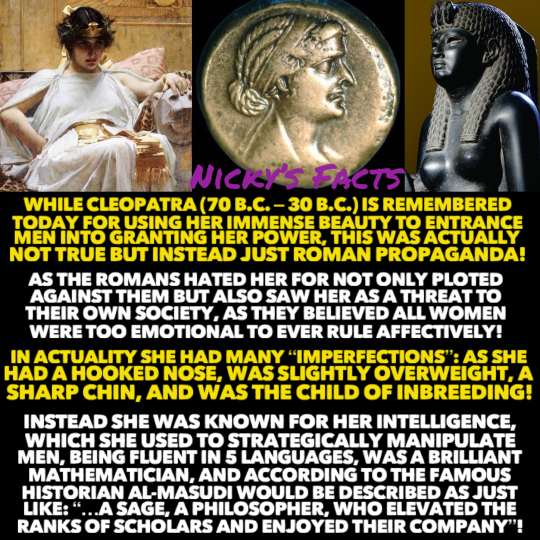
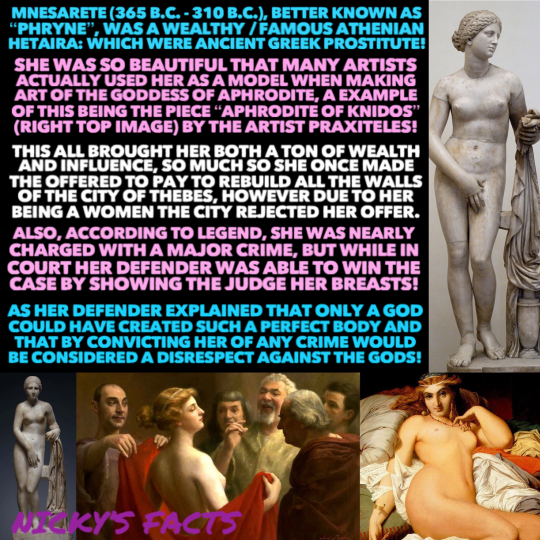
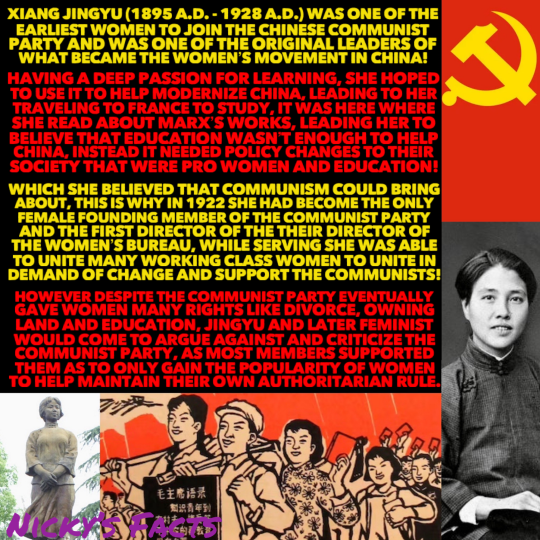
Happy Women’s History Month!
👩🏻🏫🚺👩🏿⚕️
To celebrate here are a couple of examples of historical women from around the world that showcase how we have always been leaders, in every sense of the word!
👩🏽🍳🚺👸🏼
#history#womens history month#girl power#women empowerment#female leaders#women in history#this is what makes us girls#role models#sisterhood#grl pwr#powerful women#historical figures#nickys facts
28 notes
·
View notes
Text

Thisabeau
#i was looking for dialogue earlier I didn’t see the thing before about her kind of being expected to end up working for the church bc of her#family’s history with that and iirc implying that specifically the women would be expected to do that hmmmmmmmm (thinks about isabeau)#something about everyone’s expectations going into the rite. very interesting to me#Walter didn’t seem to have considered it much at all and expected to just go back home and work his family trade that he hates#whereas Jonathan was trained since a child for it by his father#so perhaps isabeaus position can be owed to her being able to understand walters point/feelings of having some inescapable set role#to fulfill in life that’s unexpectedly overturned . like. i think she probably gets it more than Jonathan at least#^ the isabeau thinker
7 notes
·
View notes